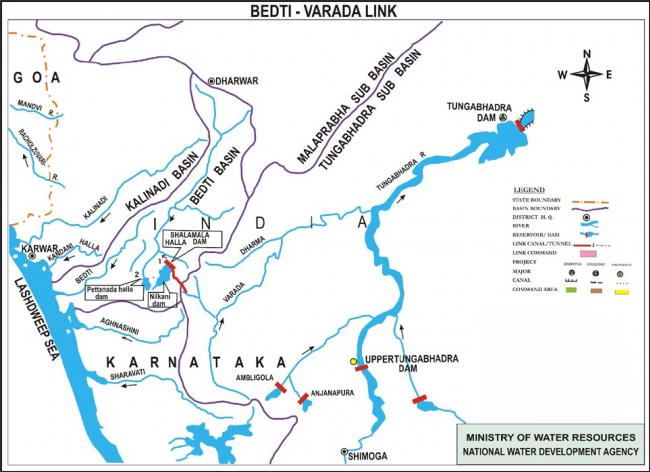Bedti-Varada River Interlinking Project | 24 Jun 2022
For Prelims: Bedti- Varada River Interlinking Project, Tungabhadra River
For Mains: Issues of Rivers Interlinking Projects
Why in News?
Environmental groups in Karnataka have criticised the project to link the Bedti and Varada rivers in Karnataka, calling it unscientific and a waste of public money.
What is the Bedti-Varada Project?
- The Bedti-Varada project was envisaged in 1992 to supply drinking water.
- The plan aims to link the Bedti, a river flowing west into the Arabian Sea, with the Varada, a tributary of the Tungabhadra River, which flows into the Krishna, which in turn flows into the Bay of Bengal.
- A massive dam will be erected at Hirevadatti in Gadag district.
- A second dam will be built on the Pattanahalla river at Menasagoda in Sirsi, Uttara Kannada district.
- Both dams will take water to the Varada via tunnels.
- The water will reach Kengre and will then go down a 6.88 km tunnel to Hakkalumane, where it will join the Varada.
- The project thus envisages taking water from the water surplus Sirsi-Yellapura region of Uttara Kannada district to the arid Raichur, Gadag and Koppal districts.
- A total of 302 million cubic metres of water from Pattanahalla and Shalmalahalla tributaries of the Bedti and Varada rivers, while 222 million cubic metres of water will be drawn from the barrage at Suremane built against the Bedti river.
- The Project would need 61 megawatts of power to pull the water all the way to Gadag. Even after this, it is unknown whether the water would reach Gadag.
What are the Issues associated with this Project?
- Difficult to Redirect:
- It is difficult to redirect a westward-flowing river to flow eastward.
- Rain-fed Rivers:
- In early summer, the Bedti and Varada rivers begin to dry up.
- It is a sad irony that government scientists plan to interconnect these rivers under the pretext of providing drinking water despite knowing well that they do not flow all year.
- Project Report not Accurate:
- The Detailed Project Report (DPR) drawn up by the irrigation department is not accurate as it was drawn without assessing the availability of water and quoting the observation of the National Water Development Agency (NWDA) report on the interconnection of the Bedti-Aghanashini and Varada rivers.
- Environmental Impact:
- Over 500 acres of forests will be lost. The end result will be that there will still be no water.
- Flora and fauna will also suffer due to this project.
- The Bedti valley has been designated as an active biodiversity zone by the International Union for Conservation of Nature.
- The area is home to 1,741 types of flowering plants as well as 420 species of birds and animals.
- The nutrients that the river carries with it are responsible for sustaining fish stocks, especially in the Bedti’s estuary in Dedi.
- The river valley serves as a corridor for around 35 different animal species. The Bedti is known as Gangavali in the estuary region.
- Affect Lifelines for Thousands:
- The Bedti and Varada rivers are also lifelines for thousands of farmers in the Malenadu region, the foothills of the Western Ghats, in addition to fishing communities along the coast.
Way Forward
- Interlinking of rivers has its pros and cons, but given the economic, political, and environmental implications, it may not be a wise decision to carry out this project at a centralized national level.
- Instead, interlinking rivers may be pursued in a decentralized manner, and more sustainable ways like rainwater harvesting should be promoted to mitigate floods and droughts.
UPSC Civil Services Examination, Previous Year Question (PYQ)
Q. Recently, linking of which of the following rivers was undertaken? (2016)
(a) Cauvery and Tungabhadra
(b) Godavari and Krishna
(c) Mahanadi and Sone
(d) Narmada and Tapti
Ans: (b)
Exp:
- Godavari and Krishna rivers were interlinked in Andhra Pradesh’s West Godavari district under the Pattiseema Lift Irrigation Project.
- Therefore, option (b) is the correct answer.

